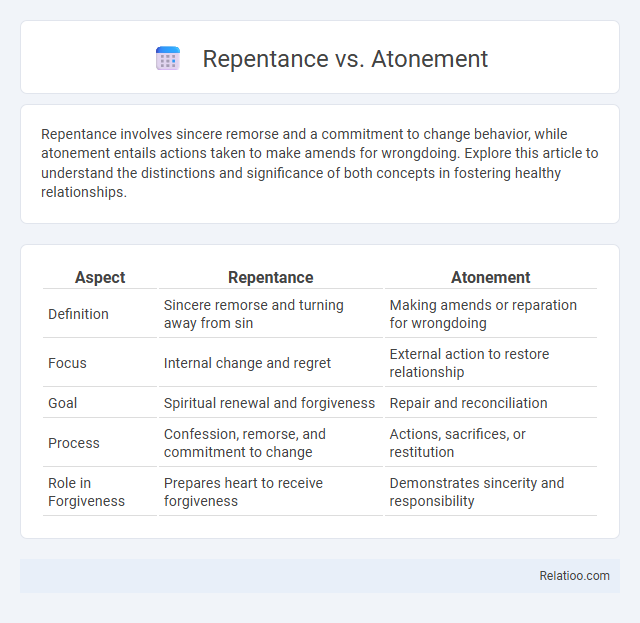Repentance involves sincere remorse and a commitment to change behavior, while atonement entails actions taken to make amends for wrongdoing. Explore this article to understand the distinctions and significance of both concepts in fostering healthy relationships.
Table of Comparison
| Aspect | Repentance | Atonement |
|---|---|---|
| Definition | Sincere remorse and turning away from sin | Making amends or reparation for wrongdoing |
| Focus | Internal change and regret | External action to restore relationship |
| Goal | Spiritual renewal and forgiveness | Repair and reconciliation |
| Process | Confession, remorse, and commitment to change | Actions, sacrifices, or restitution |
| Role in Forgiveness | Prepares heart to receive forgiveness | Demonstrates sincerity and responsibility |
Understanding Repentance: A Foundational Concept
Understanding repentance is crucial as it involves sincere remorse and a heartfelt commitment to change behavior, distinguishing it from atonement, which focuses on making amends for wrongdoings. Repentance serves as the foundational concept that initiates personal transformation, motivating individuals to seek forgiveness and restore relationships. Your ability to genuinely repent establishes the groundwork for atonement, ensuring that reconciliation and healing are meaningful and effective.
Defining Atonement: Origins and Meanings
Atonement traces its origins to Old English and Hebrew words meaning "to reconcile" or "to make amends," emphasizing restoring harmony between parties after wrongdoing. Unlike repentance, which involves sincere remorse and turning away from sin, atonement specifically addresses the act of repairing the damage caused by sin, often through rituals or sacrifices. Your understanding deepens as you distinguish atonement's role in religious and moral contexts, focusing on restitution rather than just internal regret.
Historical Perspectives on Repentance and Atonement
Historical perspectives on repentance emphasize its role as a personal acknowledgment of wrongdoing and a commitment to change, often rooted in religious traditions like Christianity, Judaism, and Islam. Atonement, historically, extends beyond repentance by involving specific rituals, sacrifices, or actions designed to reconcile the individual or community with the divine or restore moral order. Your understanding of these concepts deepens by recognizing that while repentance focuses on internal transformation, atonement addresses the external restoration of relationships and justice.
Repentance in Religious Traditions
Repentance in religious traditions involves sincere remorse and a commitment to change one's behavior, often seen as essential for spiritual cleansing and reconciliation with the divine. Unlike atonement, which primarily focuses on making amends or reparations for sins, repentance emphasizes internal transformation and sincere confession. Many faiths, including Christianity, Judaism, and Islam, regard repentance as the foundational step toward forgiveness and restoring a moral relationship with God.
Atonement Across Different Faiths
Atonement across different faiths involves rituals or practices intended to restore a right relationship between humans and the divine, often following sin or moral failings. In Christianity, atonement centers on Jesus Christ's sacrificial death as a means of redeeming humanity and forgiving sins, while Judaism emphasizes repentance (teshuvah), prayer, and acts of charity during Yom Kippur for spiritual cleansing. Islam views atonement through sincere repentance (tawbah), increased worship, and seeking God's mercy, highlighting a direct and personal reconciliation with Allah without an intermediary.
Key Differences Between Repentance and Atonement
Repentance involves genuine remorse and a commitment to change one's behavior, while atonement focuses on making amends or repairing the harm caused by wrong actions. Repentance is an internal, personal process aimed at moral transformation, whereas atonement often requires external actions, such as restitution or seeking forgiveness from those affected. The key difference lies in repentance emphasizing personal conscience and intent, with atonement addressing tangible consequences and reconciliation.
The Role of Forgiveness in Repentance and Atonement
Repentance involves recognizing wrongdoing and feeling genuine remorse, which leads to a change in behavior and a sincere desire for forgiveness. Atonement goes beyond repentance by actively making amends or offering restitution to repair the harm caused. Your path to healing is strengthened when forgiveness acts as a bridge, allowing both repentance and atonement to restore relationships and foster spiritual renewal.
Psychological Impact: Healing Through Repentance vs Atonement
Repentance involves a personal acknowledgment of wrongdoing and a sincere commitment to change, which can lead to profound psychological healing by fostering self-awareness and emotional relief. Atonement, on the other hand, often includes making amends or reparations, helping to restore social relationships and alleviate guilt, which further supports mental well-being. Your emotional recovery is enhanced by combining both repentance and atonement, as this holistic approach addresses internal guilt and external consequences.
Repentance and Atonement in Modern Life
Repentance involves sincere remorse for past wrongs and a commitment to change your behavior, serving as a foundational step toward personal growth and healing in modern life. Atonement goes beyond acknowledgment by actively making amends or reparations to restore relationships and moral balance. Together, repentance and atonement play crucial roles in fostering accountability and emotional well-being in today's fast-paced society.
Integrating Repentance and Atonement for Personal Growth
Integrating repentance and atonement fosters profound personal growth by combining sincere remorse with actionable steps toward making amends. Repentance involves recognizing and feeling genuine regret for wrongdoing, while atonement emphasizes the repair and restitution necessary to restore moral balance. Together, they create a transformative process that cultivates accountability, self-awareness, and ethical development essential for lasting change.

Infographic: Repentance vs Atonement
 relatioo.com
relatioo.com